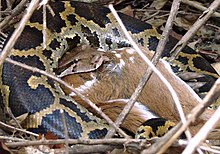
Back Predasie Afrikaans Depredación AN افتراس Arabic Depredación AST Yırtıcılıq Azerbaijani Драпежніцтва Byelorussian Хищничество Bulgarian Predacija BS Depredació Catalan نێچیرگری CKB


In ecology, predation describes a relationship and actions between two creatures. A predator catches, attacks, and eats its prey.[1] Predators may or may not kill their prey before eating them. But the act of predation always causes the death of its prey and taking in the prey's body parts into the predators body. A true predator can be thought of as one which both kills and eats another animal, but many animals act as both predator and scavenger.
A predator is an animal that hunts, catches, and eats other animals. For example, a spider eating a fly caught at its web is a predator, or a pack of lions eating a buffalo. The animals that the predator hunts are called prey. Predators mostly do not eat other predators.[2] [3] [4] It has also been suggested that they know it may transmit disease. [5] A top predator or apex predator is one that is not the prey of other predators.
Predators are usually carnivores (meat-eaters) or omnivores (eats plants and other animals). Predators will hunt other animals for food. Examples of predators are hawks, eagles, falcons, cats, crocodiles, snakes, raptors, wolves, killer whales, lobsters, lions, and sharks.
- ↑ Begon M; Townsend C. & Harper J. 1996. Ecology: Individuals, populations and communities. 3rd ed, Blackwell Science, London. ISBN 978-0-86542-845-4, ISBN 978-0-632-03801-5, ISBN 978-0-632-04393-4
- ↑ "Why Don't Predators Often Eat Other Predators? - Londolozi Blog". 3 March 2018.
- ↑ "Carnivore". education.nationalgeographic.org. Retrieved 20 September 2023.
- ↑ "Do predators eat each other? | SiOWfa16: Science in Our World: Certainty and Controversy". sites.psu.edu. Retrieved 20 September 2023.
- ↑ "Carnivores know that eating other carnivore carcasses transmits diseases". phys.org. Retrieved 20 September 2023.